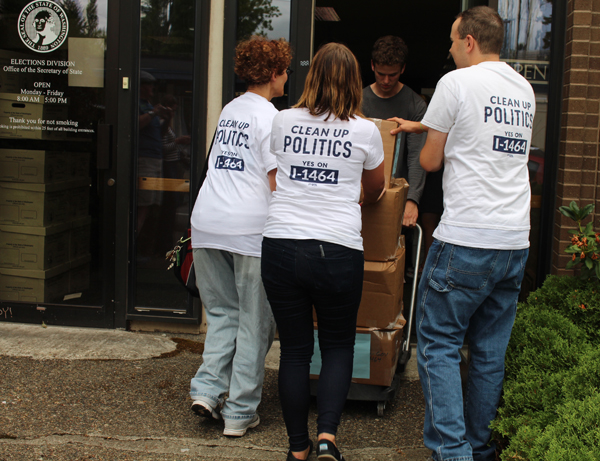I-1501, I-1464 sponsors turn in signatures
I-1464 supporters bring boxes of signatures into the Elections Division office.
Two initiative campaigns delivered signatures to the state Elections Division in Olympia Friday afternoon, the last of four measures to bring in petition sheets before the turn-in deadline. All brought in a substantial pad and are considered likely to make the statewide fall ballot, along with a pair of initiatives to the Legislature. Six initiatives will be an unusually large number for Washington.
Initiative 1501 sponsors submitted around 322,000 signatures Friday. I-1501 would increase penalties for criminal identity theft and consumer fraud targeting seniors and vulnerable individuals.
Soon after the I-1501 team left, Initiative 1464 sponsors arrived with more than 326,000 signatures. I-1464 would create a state-funded campaign finance program.
Friday was the deadline to submit signatures for initiatives to the people filed this year.
Sponsors for I-1433 (raising state’s minimum wage) turned in over 400,000 signatures in separate installments Wednesday, Thursday and Friday.
One of the boxes of signatures for I-1501.
On Thursday, Initiative 1491 backers submitted about 304,000 signatures Thursday, and they brought in about 31,000 more Friday for a total exceeding 335,000. I-1491 would allow police, family, or household members to obtain court orders temporarily preventing firearms access by persons exhibiting mental illness, violent or other behavior indicating they may harm themselves or others.
The Elections Division recommends that initiative sponsors submit at least 325,000 signatures to provide a cushion to cover duplicate or invalid signatures. The average error rate is 18 percent.
The four initiatives appear to qualify for a 3 percent random sample check instead of a review of all submitted signatures.
Based on history, it’s likely that all four initiatives that turned in signatures this week will earn a place on the fall ballot, Elections Division officials said.
An elections crew does a preliminary check of the incoming petitions, looking for any obvious problems or potential fraud, repairing any damaged petitions and counting the number of petition sheets. The complete set of signatures for that initiative is sent to the state Archives for scanning and an electronic version is returned to Elections for verification.
During the week of July 11, a crew will do prep work of all initiatives filed, including identification of the names to be checked under random sampling. A computer program generates the random selection. Beginning the week of July 18, a second team will begin scrutiny of each identified signature, looking to make sure the person is a registered Washington voter and that the signature matches the one on file. Any duplicates are also noted. The process takes three or four days for each initiative.
The initiatives are generally processed in the order received.
At least two shifts of workers will be needed this year.
Two other citizen-generated measures, Initiatives to the Legislature 732 (carbon taxes) and 735 (opposing Citizen United court decision), already have qualified for the fall ballot.
Go here to view all of the initiatives to the people filed this year.

